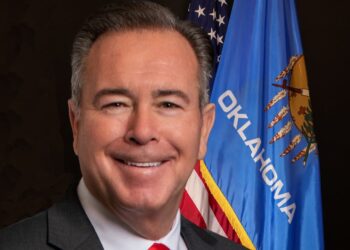OKLAHOMA CITY (OBV) – The Oklahoma Senate Finance Committee met Monday and passed several bills that are crucial to reshaping Oklahoma’s tax system.
The Finance Committee passed House Bill 1375, House Bill 1645, House Bill 2285, House Bill 2451 and House Bill 2695.
HB 1375, authored in the Senate by Sen. Dave Rader, R-Tulsa, who serves as chairman of the Finance Committee, passed the committee with an 8-2 vote. The bill replaces the three-pronged apportionment formula that the state uses to calculate corporate income tax with a single-sales factor formula.
Oklahoma’s apportionment formula consists of sales, payroll and property weighted equally and a throwback rule which takes out-of-state sales and lumps them into a corporation’s Oklahoma income when the corporation makes sales in a state that does not tax the income. The sales part of the current formula can be 50 percent for companies making an investment of $200 million or more into the state.
The single-sales factor formula only calculates in-state sales.
“Oklahoma companies through this three-factor apportionment formula are being overtaxed,” Rader said when presenting the bill during the committee meeting.
Switching from the three-pronged apportionment formula to a single-sales factor will reduce the tax burden on businesses, Rader said.
HB 1645, authored in the Senate by Sen. Brent Howard, R-Altus, passed the committee with an 8-2 vote. The bill works in conjunction with HB 1375 by seeking to eliminate the throwback rule.
“It’s possible we’re not getting businesses that are warehoused here because we’re creating a tax on products that were never part of our tax stream,” Howard said. “This is one of the things we get dinged on because we’re taxing products that have only transitioned through here, so that doesn’t incentivizes businesses to come here.”
HB 2285, also authored in the Senate by Rader, passed 8-2. The bill aims to modify individual income tax through the following changes:
- Consolidating six tax brackets into one;
- Increasing the standard deduction to ensure no increased tax liability on low-income filers;
- Reducing the current rate from 4.75 percent to 4.5 percent;
- Putting sound triggers in place for future rate cuts, only if conditions permit.
HB 2451, authored in the Senate by Sen. John Michael Montgomery, R-Lawton, passed 6-4 with two constitutional privileges. The bill creates tax incentives for employers and workers in an effort to grow Oklahoma’s childcare industry and make childcare more readily available to working parents.
If signed into law, 2451 will do the following:
- Qualified childcare workers will receive an annual $500 tax credit;
- Employers who provide a childcare subsidy for their employees will receive an annual tax incentive up to $30,000;
- Employers who develop or build a childcare facility for employees will receive a tax incentive up to $45,000.
HB 2695, also authored in the Senate by Montgomery, passed with a 9-2 vote. The bill proposes to eliminate the franchise tax as well as requirements to file a franchise tax return.
The state’s franchise tax is a direct tax levied on a company’s net worth, taxing $1.25 for every $1,000 in capital, with the amount capped at $20,000, regardless of the company’s size or net worth.
Fourteen states, including Oklahoma, have the franchise tax. Mississippi and Connecticut are both in process of phasing out their franchise tax.
Out of the 400,000 plus businesses in the state, only around 70,000 businesses pay a franchise tax, according to information from The State Chamber Research Foundation.

















